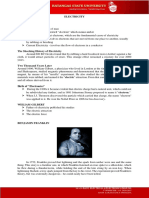0 ratings0% found this document useful (0 votes)
38 viewsElectronics - Module 1 (Summary)
Electricity began with observations of static electricity generated through rubbing amber. Over centuries, scientists discovered various electrical phenomena like batteries, generators, motors, and transformers. Their work established the foundations of modern electricity and electronics. Affordable, reliable electricity is now fundamental to modern life, powering smartphones, computers and other technologies we rely on daily.
Uploaded by
Are you kidding meCopyright
© © All Rights Reserved
Available Formats
Download as DOCX, PDF, TXT or read online on Scribd
0 ratings0% found this document useful (0 votes)
38 viewsElectronics - Module 1 (Summary)
Electricity began with observations of static electricity generated through rubbing amber. Over centuries, scientists discovered various electrical phenomena like batteries, generators, motors, and transformers. Their work established the foundations of modern electricity and electronics. Affordable, reliable electricity is now fundamental to modern life, powering smartphones, computers and other technologies we rely on daily.
Uploaded by
Are you kidding meCopyright
© © All Rights Reserved
Available Formats
Download as DOCX, PDF, TXT or read online on Scribd
You are on page 1/ 2
Electronics – Module 1 In 1780, he discovered that the muscles
of dead frogs’ legs twitched when struck
History of Electricity and Electronics by an electrical spark. This was one of
1737-1798 Luigi Galvani the first forays into the study of
Electricity is an essential part of modern life, so vital that most bioelectricity, a field that still studies the
of us cannot imagine a life without it. But amazingly, it has only been electrical patterns and signals from
an everyday aspect of our lives for a little over a century. tissues such as the nerves and muscles.
He made the revolutionary discovery that
Andre-Marie a wire carrying electric current can attract
1775-1836
Year Scientist/Inventor Event/Discovery/Invention Ampere or repel another wire next to it if that wire
is also carrying electric current.
Discovered static electricity by rubbing
fur/wool on substances, such as amber. Discovered the Ohm’s law, named after
624-546 BC Thales of Miletus him, which states that the current flow
A charged amber can attract light objects
such as bits of paper and hair. George Simon through a conductor is directly
1789-1854
Ohm proportional to the potential difference
In 1663, he discovered that first electric
(voltage) and inversely proportional to
generator, which produced static
the resistance.
electricity by applying friction against a
Otto von revolving ball or sulfur. IN 1672, he Best known for his discovery of
1602-1686 electromagnetic induction.
Guericke discovered that the electricity thus
produced could cause the surface of the Electromagnetic Induction or
sulfur to glow, hence, he became the first Induction is a process in which a
1791-1867 Michael Faraday
man to view the electroluminescence. conductor is put in a particular position
and magnetic field keeps varying or
German physicist who discovered that an magnetic field is stationary and a
electric current flows between different conductor is moving.
conductive materials that are kept as He discovered the electron and then
different temperatures, known as the Joseph John went on to propose a model for the
Seebeck effect. Seebeck Effect is a 1856-1940 Thompson structure of the atom known as the “plum
Thomas Johann phenomenon in which a temperature pudding” model.
1770-1831
Seebeck difference between two dissimilar He is famous in his invention of Tesla
electrical conductors or semiconductors coil, an electrical resonant transformer
produces a voltage difference between circuit used to produce high frequency
the two substances. This can be applied 1858-1943 Nikola Tesla alternating current electricity. He
to thermal-to-electrical energy invented the first alternating current (AC)
conversion. motor and developed AC generation and
French physicist best known for the transmission technology,
formulation of Coulomb’s law, which He invented a string galvanometer that
states that the force between two could be used to directly record the
electrical charges is proportional to the electrical activity of the heart known as
Charles Augustin
1736-1806 product of the charges and inversely Einthoven galvanometer”. With this
de Coulomb William
proportional to the square of the distance 1860-1927 instrument, he was able to measure the
Einthoven
between them. Coulombic force is one changes of electrical potential caused by
of the principal forces involved in atomic contractions of the heart muscle and to
reactions. record them graphically, in which he
called this process as electrocardiogram.
He was an inventor of the Van de Graaf Benjamin Franklin introduced the terms “positive” and
Generator, a device which produces very “negative” charges. Back in 1752, when he demonstrated that
high voltage direct current electricity at lightning was electrical with his famous kite experiment, people could
low current levels. A Van de Graaf
Robert Van De nit even fathom the many conveniences and luxuries that electricity
1901-1967 generator is an electrostatic generator
Graaff would bring to the 20th and 21st centuries.
which uses a moving belt to accumulate
electric charge on a hollow metal globe
on the top of an insulated column, The very first cell phone call was made on April 3, 1973 by
creating very high electric potentials. Martin Cooper. He is an American engineer who led the team in 1972-
1973 to build the first mobile cellphone and its widely regarded as the
father of the cellular phone.
Abstraction and Generalization
Affordable reliable electricity is fundamental to modern life.
Electricity began with man’ curiosity on the peculiar ability of Electricity provides all the comfort we can think of, and it quietly
amber, a hard translucent yellowish-brown fossil resin, to attract bits breathes life into the digital world we tap into with our smartphones
of material after it was rubbed with fur. and computers.
At the turn of the 17th century, William Gilbert, an English
scientist, was the first person to use the word electricity from the
Greek word electron, meaning ‘amber’. He believed that electricity
was caused by a moving fluid called humor.
You might also like
- History of Electronics: Year Person WorksNo ratings yetHistory of Electronics: Year Person Works2 pages
- Static Electricity: Module 1: History of ElectricityNo ratings yetStatic Electricity: Module 1: History of Electricity7 pages
- Beige and Pink Professional Chronological Timeline InfographicNo ratings yetBeige and Pink Professional Chronological Timeline Infographic1 page
- CHAPTER-1-INTRO-TO-ELECTRICITY-....................No ratings yetCHAPTER-1-INTRO-TO-ELECTRICITY-....................10 pages
- Electricity Timeline - History of Electricity - Science WikiNo ratings yetElectricity Timeline - History of Electricity - Science Wiki8 pages
- Benjamin Franklin ° 1752 ° Michael Faraday ° 1831 °No ratings yetBenjamin Franklin ° 1752 ° Michael Faraday ° 1831 °1 page
- Electricity: Lightning Is One of The Most Dramatic Effects of ElectricityNo ratings yetElectricity: Lightning Is One of The Most Dramatic Effects of Electricity18 pages
- G10 8th Lesson Proponents of ElectromagnetismNo ratings yetG10 8th Lesson Proponents of Electromagnetism21 pages
- Circuits Education Presentation in Blue Yellow Flat Cartoon StyleNo ratings yetCircuits Education Presentation in Blue Yellow Flat Cartoon Style17 pages
- Introduction To Electrical Engineering: - Engr. Homer O. Principe, PEENo ratings yetIntroduction To Electrical Engineering: - Engr. Homer O. Principe, PEE11 pages
- historyofelectricity-240828082653-8f006a9aNo ratings yethistoryofelectricity-240828082653-8f006a9a17 pages
- A Timeline of Events in ElectromagnetismNo ratings yetA Timeline of Events in Electromagnetism6 pages
- Electricity: Lightning Is One of The Most Dramatic Effects of ElectricityNo ratings yetElectricity: Lightning Is One of The Most Dramatic Effects of Electricity20 pages
- Electricity Is A General Term Encompassing A Variety of Phenomena Resulting From The Presence and Flow of Electric ChargeNo ratings yetElectricity Is A General Term Encompassing A Variety of Phenomena Resulting From The Presence and Flow of Electric Charge17 pages
- Liceo de Apodaca Miguel Leon Tavizón ElectricityNo ratings yetLiceo de Apodaca Miguel Leon Tavizón Electricity8 pages
- Developmental Milestone of ElectromagnetismNo ratings yetDevelopmental Milestone of Electromagnetism30 pages
- Basic Electronics: Lesson 1: IntroductionNo ratings yetBasic Electronics: Lesson 1: Introduction24 pages
- Makalah Bahasa Inggris: Disusun Oleh: Teknik ElektroNo ratings yetMakalah Bahasa Inggris: Disusun Oleh: Teknik Elektro9 pages
- The Five Scientist Behind Electromagnetic SpectrumNo ratings yetThe Five Scientist Behind Electromagnetic Spectrum7 pages
- Presentación Investigación Sobre "Electricidad, Magnetismo y Óptica" - Alison Avilés y Kasandra CañizoNo ratings yetPresentación Investigación Sobre "Electricidad, Magnetismo y Óptica" - Alison Avilés y Kasandra Cañizo20 pages
- The Dawn of Amateur Radio in the U.K. and Greece: a personal viewFrom EverandThe Dawn of Amateur Radio in the U.K. and Greece: a personal viewNo ratings yet
- Cell Line Profile: ECACC Catalogue No. 84113001No ratings yetCell Line Profile: ECACC Catalogue No. 841130012 pages
- Definition of Distribution Logistics From The Producer To The CustomerNo ratings yetDefinition of Distribution Logistics From The Producer To The Customer2 pages
- Ch-2&3; particle and fiber board ppt (2)No ratings yetCh-2&3; particle and fiber board ppt (2)19 pages
- AWS Solutions Architect Associate Study PlanNo ratings yetAWS Solutions Architect Associate Study Plan5 pages
- (Ebooks PDF) Download Dermatopathology Dirk Elston Full Chapters100% (4)(Ebooks PDF) Download Dermatopathology Dirk Elston Full Chapters54 pages
- ALGEBRAIC EXPRESSIONS Term 2 Lesson 7 Grade 8No ratings yetALGEBRAIC EXPRESSIONS Term 2 Lesson 7 Grade 85 pages
- Information Note On Indonesia's ASEAN Chairmanship Priorities - As of 3 Feb 2023No ratings yetInformation Note On Indonesia's ASEAN Chairmanship Priorities - As of 3 Feb 20234 pages
- Manual - Aquastar 54 - Aquastar 54 LED PDFNo ratings yetManual - Aquastar 54 - Aquastar 54 LED PDF80 pages
- Target constants for Leica Total StationNo ratings yetTarget constants for Leica Total Station4 pages
- Western Civilization 9th Edition Jackson J. Spielvogel - Read the ebook online or download it as you prefer100% (1)Western Civilization 9th Edition Jackson J. Spielvogel - Read the ebook online or download it as you prefer52 pages
- Sample Contracts: Deed of Bargain and SaleNo ratings yetSample Contracts: Deed of Bargain and Sale1 page
- Ash Handling System: in A 210 M.W Boiler, The Coal Consumption Is 3,500 M.T S Per Day The Ash Content Is 1,400 M.T SNo ratings yetAsh Handling System: in A 210 M.W Boiler, The Coal Consumption Is 3,500 M.T S Per Day The Ash Content Is 1,400 M.T S22 pages

























































































